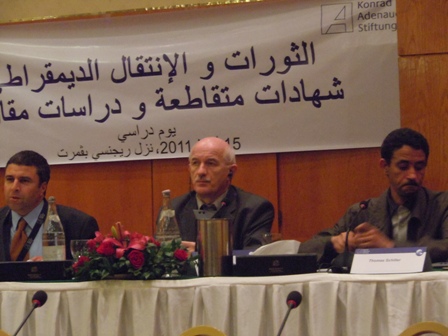TUNIS: CNDH HIGHLIGHTS MOROCCAN EXPERIENCE IN TRANSITIONAL JUSTICE
Mr. Hamid El Kam, Adviser to the President of the National Human Rights Council (CNDH) represented the Council in a seminar organized in the Tunisian capital on democratic transition, on 15 April 2011.This seminar was organized by the German institution "Konrad Adenauer" and the UNESCO Chair in comparative studies of religions.

In his presentation, Mr. El Kam defined the concept of transitional justice as a way to implement a justice that’s appropriate to transitional phases or stages of a political system or society. He emphasized the need for genuine political will that responds positively to the will of society, institutions and civil society stakeholders in order to ensure the success of any transitional experience, pointing out to the fact that every experience of democratic transition has its own characteristics.
The CNDH representative highlighted the five key components of transitional justice namely accountability, the establishment of truth and responsibilities, individual and collective reparation and compensation for victims, reconciliation (mainly the political social reconciliation) and reforms (to guarantee non-repetition of human rights violations).
Mr. Kam shed light on the fundamentals of the Moroccan experience in the field of transitional justice through the creation of the Equity and Reconciliation Commission (IER).
In this context, he clarified that the creation of this truth commission, as a mechanism of transitional justice, came as a result of a gradual evolution to solve and settle the issue of past grave human rights violations in Morocco. It is also the result of a series of studies and debates among the active political and civil society stakeholders, in order to find the best measures to address and find fair settlement to the conflicts of the past, he said.
This commission, Mr. El Kam explained, was created by virtue of a royal decree, on November 6, 2003, following a recommendation submitted by the National Human Rights Council (Advisory Council on Human Rights at the time). The IER assessed and investigated human rights violations perpetuated between 1956 until 1999.
The Equity and Reconciliation Commission was concerned, during its term, by all serious systematic human rights violations and contributed to the reinforcement of the foundations of global reconciliation, Mr. El Kam stated.
He summarized the four strategic objectives of the IER: confirming seriousness and extent of human rights violations, compensating victims and their rights holders, preparing a final report with recommendations and proposals to guarantee the preservation of memory and non-repetition of past human rights violations and launching dynamics of dialogue and collective reflection on the foundations of reconciliation and the promotion of human rights.
Mr. El Kam reiterated that the Moroccan experience in the field of transitional justice is called to face a number of challenges. These challenges include, he said, the contribution to the establishment of a democratic society that respects the principles and values of human rights, democracy and equality, the effective implementation of the road map of reforms, the constitutionalization of guarantees to ensure the non-repetition of past human rights violations and the institutionalization of the cultural impact policy to change the conduct and behavior of society in light a human rights perspective.






















